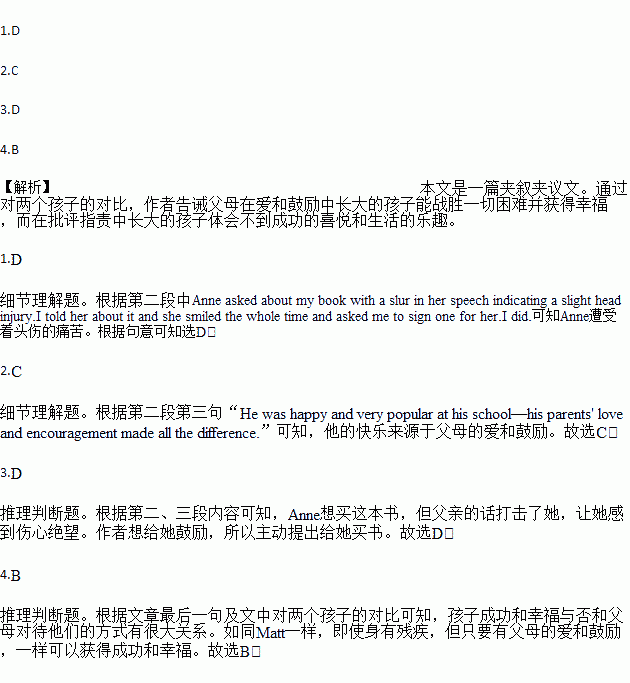题目内容
Before I spoke to his school,Matt was waiting for me.He sat in his wheelchair unable to move.As soon as he saw me he started smiling.He could not talk but I pretended the sharks were eating his cereal and his laugh melted the hearts of everyone walking by.
One of the teachers told me that he was actually very smart,he just could not control his muscles due to a childhood disease.He was happy and very popular at his school—his parents' love and encouragement made all the difference.On the contrary,at a book signing session,I met a girl by the name of Anne.She walked up with her morn with a bright smile.Anne asked about my book with a slur in her speech indicating a slight head injury.I told her about it and she smiled the whole time and asked me to sign one for her.I did.
Five minutes later,I heard a voice from Anne's father,"You know you will not understand the book.You aren't smart enough."He said it so loudly that people were staring in their direction.She was absolutely crushed and her bright smile was now replaced with a look of total despair(绝望).He brought the book back to me and asked me to take it back.I asked him if he would allow me to purchase the book for Anne.He said no with a heartless response.I thought back to Matt.He could not speak,walk,run or play but was actually very happy and even doing well in school because of the love and encouragement of his parents.Anne on the other hand had a slight learning problem and may never know happiness or success because of a stern father.
What kind of parent are you? The truth is that whatever you are telling your kids-makes the difference between their success or failure in life.
1.What is Anne's problem?
A. She was in total despair. B. She wasn't smart enough.
C. She can't speak and read. D. She suffered from head injury.
2.According to the author,Matt's happy life mainly lies in .
A. the teachers' help
B. the author's appreciation
C. his parents' support and encouragement
D. the friendly attitude of all the people around
3.Why did the author want to buy the book for Anne?
A. To show her care for her.
B. To help her to improve her reading ability.
C. To teach the father how to educate children.
D. To save her from feeling uncomfortable.
4.What can we infer from the conditions of the two children?
A. They need more people to help them.
B. What parents do plays an important part in their children's success.
C. They are suffering different difficulties to some extent.
D. The children with disability are well worth sympathizing.
 阅读快车系列答案
阅读快车系列答案

 children. Four-year-old Chinese children can count, on average, to 40. American children at that age can count only to 15. By the age of five, in other words, American children are already a year behind their Asian friends in the most fundamental of math skills.
children. Four-year-old Chinese children can count, on average, to 40. American children at that age can count only to 15. By the age of five, in other words, American children are already a year behind their Asian friends in the most fundamental of math skills.